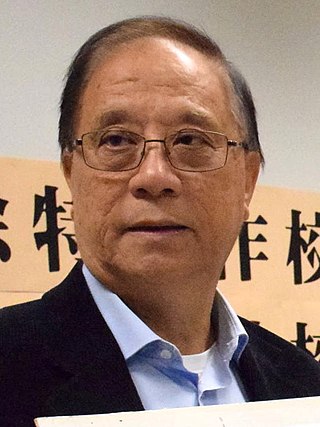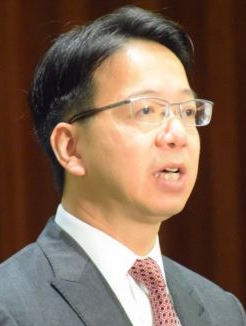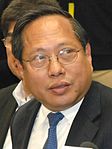
Leung Kwok-hung, also known by his nickname "Long Hair" (長毛), is a Hong Kong politician and social activist. He was a member of the Legislative Council, representing the New Territories East. A Trotskyist in his youth, he was a founding member of the Revolutionary Marxist League. He became a political icon with his long hair and Che Guevara T-shirt in the protests before he was elected to the Legislative Council in 2004. In 2006, he co-founded a social democratic party, the League of Social Democrats (LSD) of which he was the chairman from 2012 to 2016.

Rita Fan Hsu Lai-tai is a senior Hong Kong politician. She was the first President of the Hong Kong SAR Legislative Council from 1998 to 2008 and a member of the Standing Committee of the National People's Congress (NPCSC).

The Hong Kong Island geographical constituency was one of the five geographical constituencies in the elections for the Legislative Council of Hong Kong from 1998 to 2021. It was established in 1998 for the first SAR Legislative Council election and was abolished under the 2021 overhaul of the Hong Kong electoral system. In the 2016 Legislative Council election, it elected six members of the Legislative Council using the Hare quota of party-list proportional representation. The constituency covered all the four districts on the Hong Kong Island, namely, Central and Western, Eastern, Southern and Wan Chai. In 2020, it had 707,277 registered voters.

The Kowloon West geographical constituency was one of the five geographical constituencies of the Legislative Council of Hong Kong from 1998 to 2021. It was established in 1998 for the first SAR Legislative Council election and was abolished under the 2021 overhaul of the Hong Kong electoral system. In the 2016 Legislative Council election, it elected six members of the Legislative Council using the Hare quota of party-list proportional representation. It had 602,733 registered electorates in 2020. The constituency corresponded to the districts of Yau Tsim Mong, Sham Shui Po, and Kowloon City.

The New Territories East geographical constituency was one of the five geographical constituencies in the Legislative Council of Hong Kong. It was established in 1998 for the first SAR Legislative Council election and was abolished under the 2021 overhaul of the Hong Kong electoral system. It encompassed Sha Tin District, Tai Po District, North District and Sai Kung District. In the 2016 Legislative Council election, nine members of the Legislative Council using the Hare quota of party-list proportional representation with 1,139,616 electorates in 2020.

The New Territories West geographical constituency was one of the geographical constituencies in the Legislative Council of Hong Kong from 1998 to 2021. It was established in 1998 for the first SAR Legislative Council election and was abolished under the 2021 overhaul of the Hong Kong electoral system. Located in the western part of the New Territories, it was the largest geographical constituency in Hong Kong with 1,308,081 electorates in 2020. It consisted of Tsuen Wan District, Kwai Tsing District, Tuen Mun District, Yuen Long District and Islands District. In the 2016 Legislative Council election, it elected nine members of the Legislative Council using the Hare quota of party-list proportional representation.

The League of Social Democrats (LSD) is a social democratic party in Hong Kong. Chaired by Chan Po-ying, wife of Leung Kwok-hung, it positions itself as the radical wing of the pro-democracy camp and stresses on "street actions" and "parliamentary struggles".

Starry Lee Wai-king, SBS, JP is a Hong Kong politician and former chairperson of the largest pro-establishment Beijing-loyalist party, the Democratic Alliance for the Betterment and Progress of Hong Kong (DAB). She is a member of the Standing Committee of the National People's Congress (NPCSC), Legislative Councillor for the Kowloon Central geographical constituency, and a former Kowloon City District Councillor. From 2012 to 2016, she was a member of the Executive Council.

The pro-Beijing camp, pro-establishment camp or pro-China camp is a political alignment in Hong Kong which generally supports the policies of the Beijing central government and the Chinese Communist Party (CCP) towards Hong Kong. The term "pro-establishment camp" is regularly in use to label the broader segment of the Hong Kong political arena which has the closer relationship with the establishment, namely the governments of the People's Republic of China (PRC) and the Hong Kong Special Administrative Region (HKSAR). Pro-Beijing politicians are labeled "patriots" by pro-Beijing media and "loyalists" by the rival pro-democracy camp.

The 2007 Hong Kong District Council elections were held on 18 November 2007. Elections were held to all 18 districts of Hong Kong, returned 405 members from directly elected constituencies out of total 534 councils member. A total number of 886 candidates contesting in 364 seats, while 41 seats were uncontested. A total number of 1.4 million voters cast their ballots, consisting 38% of the electorate, significantly lower than the last elections in 2003.

The 2003 Hong Kong District Council elections were held on 23 November 2003 for all 18 districts of Hong Kong, 400 members from directly elected constituencies out of total 529 council members. It was the second District Council election after the handover of Hong Kong in 1997.
The Progressive Hong Kong Society was a political group in Hong Kong. It was established on 14 February 1985 by the then Executive and Legislative Council member Maria Tam. The party is considered conservative and pro-Beijing, in contrast to the pro-democracy forces which rose to prominence in the late 1980s and early 90s.

The 2016 Hong Kong Legislative Council election was held on 4 September 2016 for the 6th Legislative Council of Hong Kong (LegCo). A total of 70 members, 35 from geographical constituencies (GCs) and 35 from functional constituencies (FCs), were returned. The election came after the rejection of the 2016/2017 constitutional reform proposals which suggested the electoral method for the 2016 Legislative Council remains unchanged.

Andrew Wan Siu-kin is the former vice-chairman of the Democratic Party and a former member of the Kwai Tsing District Council for Shek Yam constituency. He was elected in the 2016 Hong Kong Legislative Council election through New Territories West.
The Hong Kong Legislative Council members' oath-taking controversy was a series of events surrounding the oaths of office of a dozen pro-democracy and localist camp members-elect of the Legislative Council of Hong Kong (LegCo) on 12 October 2016 which have resulted in the disqualification of six members, Sixtus "Baggio" Leung and Yau Wai-ching of Youngspiration, who were unseated by the court on 15 November 2016, and Leung Kwok-hung, Nathan Law, Yiu Chung-yim and Lau Siu-lai on 14 July 2017.

The 2018 Hong Kong Legislative Council by-election was held on 11 March 2018 for four of the six vacancies in the Legislative Council of Hong Kong (LegCo) - the Hong Kong Island, Kowloon West and New Territories East geographical constituencies and the Architectural, Surveying, Planning and Landscape functional constituency - resulting from the disqualification of six pro-democrat and localist camp Legislative Council members over the 2016 oath-taking controversy. The by-election for the two other seats was not held due to pending legal appeals by the two disqualified legislators.

The Sixth District Councils of Hong Kong was the meeting of the local councils of the Hong Kong Special Administrative Region Government. The membership of the council is based on the 2019 election. The term of the session is from 1 January 2020 to 31 December 2023. The pro-democracy camp in conjunction with the localist camp achieved its biggest landslide victory in the history of Hong Kong, gaining absolute majority in votes and electoral seats in all of the 18 District Councils. The election was widely viewed as a de facto referendum on the 2019–20 Hong Kong protests.

The Seventh Legislative Council of Hong Kong is the current meeting of the legislative branch of the Hong Kong Special Administrative Region Government. It is scheduled to meet in the Legislative Council Complex, from 1 January 2022 to 31 December 2025, overlapping the six months of Carrie Lam as the fifth term of the Chief Executive and the sixth term of the Chief Executive. The membership of the Legislative Council will be determined in the December 2021 election.
The election for the President of the Fifth Legislative Council took place on 10 October 2012 for members of the 5th Legislative Council of Hong Kong to elect the President of the Legislative Council of Hong Kong for the duration of the council.
The election for the President of the Fourth Legislative Council took place on 8 October 2008 for members of the 4th Legislative Council of Hong Kong to among themselves elect the President of the Legislative Council of Hong Kong for the duration of the Council.


















